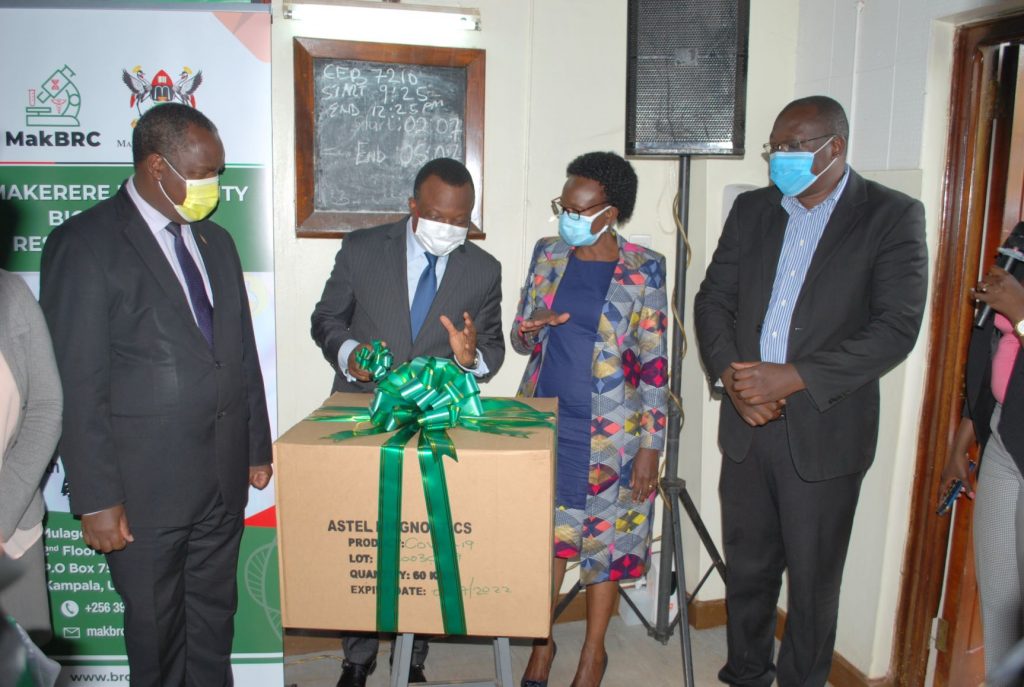
Makerere University’s Department of Immunology and Molecular Biology, College of Health Sciences has today launched the Makerere University home grown COVID-19 Rapid Antibody Test Kits. The COVID-19 Rapid Antibody Test Kits developed domestically aim to address challenges related to affordability/cost using imported items, promote research and innovation in the medical/health field and Makerere University in general.
This project was spearheaded by Dr. Misaki Wayengera, Director at the Department of Immunology and Molecular Biology, College of Health Sciences, Makerere University. These efforts are directed towards enhancing the fight against the spread of the Corona Virus not only at Makerere University but also in the entire country. Explaining the advantages of the project, Dr. Wayengera said “Makerere University has developed an affordable (costing less than US $1), easy to use (requiring minimal expertise, user guide), rapid (yielding results within 2-5 minutes) point of care test platform for COVID-19 suited for use within remote equatorial African settings. This will enable rapid testing for Coronavirus and considerably lower the cost of testing currently standing at USD 65, which is prohibitive for developing countries like Uganda. This could not have been achieved without the financial support of Partners and Institutions such as Supervised Financial Institutions under their umbrella body Uganda Bankers Association, Deposit Protection Fund of Uganda, and Government of the Republic of Uganda, the French Embassy in Uganda and Uganda’s Ministry of Science Technology and Innovation.
In the drive to raise funds towards the fight against the COVID-19 pandemic, and in response to Government’s call for support to join hands, Members of Uganda Bankers Association (UBA) and the Deposit Protection Fund contributed Ugx. 200million to the project which was in advanced stages in 2020. Speaking at the occasion, Wilbrod Owor-ED UBA applauded Makerere University for the research efforts as an academic institution and the quick turnaround invention. “The pandemic has had diverse effects on the economy and one of the most affected sectors are education, tourism & hospitality, real estate which ultimately have affected the banking sector by way of increase in Non-Performing Loans. In addition to the loan restructures that member banks have offered, as part of support to business community, we are also happy to have invested to support testing. Therefore, the affordability of this intervention is much welcome to address cost issues that would otherwise have to be so high for an average Ugandan” Owor said.
The Test Kit involves using a swab-tube dipstick to do an antigen test by use of a nasal sample. With this quick test, once the nasopharyngeal sample is obtained, it is placed back into its tube containing reagents that detect the virus surface protein.
Prof. Barnabas Nawangwe, the Vice Chancellor of Makerere University noted that, the University has through College of Health Sciences built extensive expertise, experience and eco-systems across the academia and partnerships for Research and Development of pathogen diagnostic. “This kit will carry out antibody tests. It will also be used in early detection of COVID-19 cases, used in screening of travelers for COVID-19, detection of symptoms as well as aid in sero-prevalennce studies to determine previous exposure to COVID-19. Makerere University is hopeful that this will enable Uganda and other African countries to cost-effectively respond to the COVID-19 pandemic,” Nawangwe said.
Makerere University is grateful for the SEED funding (Ugx 65, 527, 020) from the Government of the Republic of Uganda through Makerere University Research and Innovations Fund (Mak-RIF) which aided initialization of this project. The Government of the Republic of Uganda is funding cross disciplinary research and innovations (over 500 projects now) at Makerere University (engaging other institutions, organizations and Ministries) for the last two financial years up to a tune of Uganda Shillings 60 billion. For all this support, we are truly grateful, Prof. Nawangwe added.
